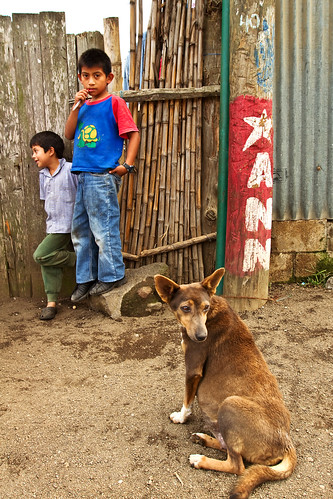A couple days after Tropical Storm Agatha swept across Guatemala on Saturday, a few images of the destruction have started to appear. Mostly the news is focusing on dramatic photos of the giant sinkhole that appeared in Guatemala City, and on the eruption of the volcano Pacaya that preceded the storm. But the destruction is far more widespread than a large sinkhole and a blanket of ash delaying tourists’ flights at the airport. Residents across almost the entire country are affected, as well as people in El Salvador and Honduras. Sadly, the media doesn’t seem to cover the tens of thousands of people who have been impacted, evacuated, or made homeless. Agatha dumped 3 feet of rain across Guatemala, and the resulting flooding and landslides have caused over 120 deaths and left 35,000 people homeless. (edit 6/3/2010: The Boston Globe’s Big Picture now has a great collection of images showing the impact of the destruction of the residents of Guatemala.)

San Miguel Dueñas before Tropical Storm Agatha – Nov. 2009
Last November I traveled to Antigua to document an NGO Open Windows and their after-school learning center in San Miguel Dueñas (see the Open Windows and Guatemala galleries on my website.) The director of the program has reported that Dueñas is badly affected by Agatha, as well as numerous other small towns around Antigua, including Ciudad Vieja, San Miguelito, San Pedro Las Huertas, Alotenango and Santiago Zamora. At this point it is only possible to get to some of these places with a four-wheel drive vehicle, so she had yet to see the damage in Dueñas herself, but had received reports that several of the homes have been badly damaged or nearly destroyed, and for some of the residents, their meager possessions have been ruined, buried, or washed away by the rains and mud. As the Open Windows staff in Dueñas reported, “they have nothing to wear, they lost everything.” As with the recent earthquake in Haiti and the flooding in Peru, it is again the most vulnerable and impoverished populations that are most badly affected by these natural disasters.

